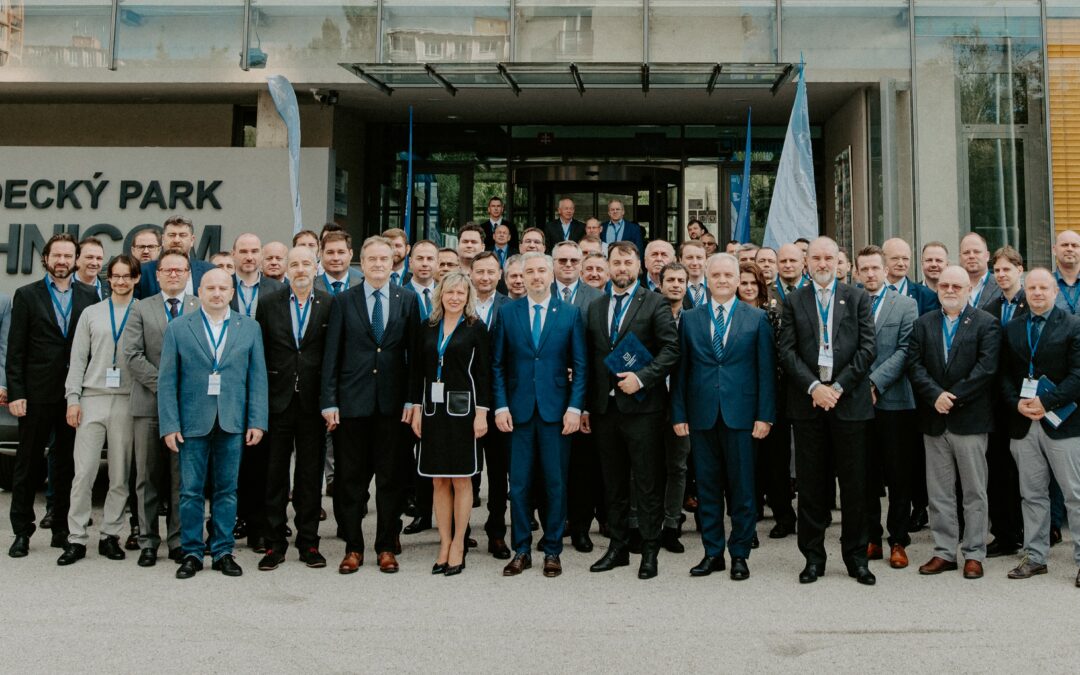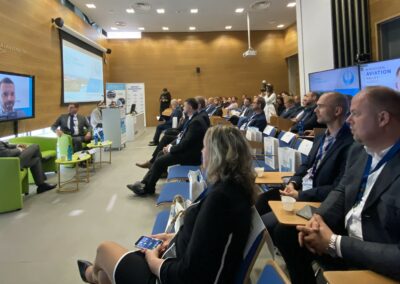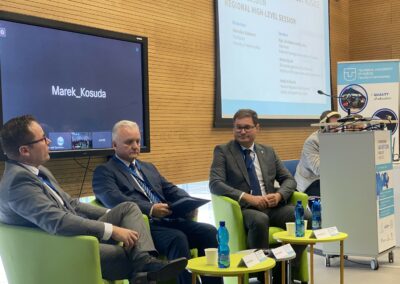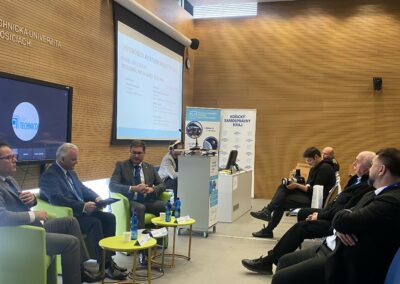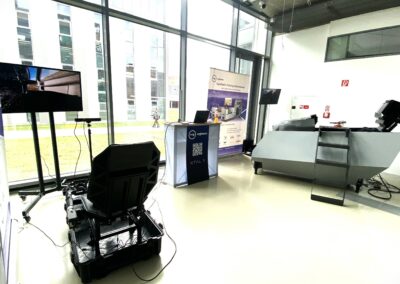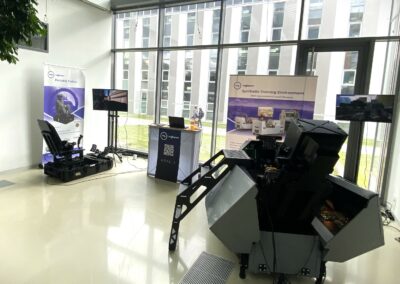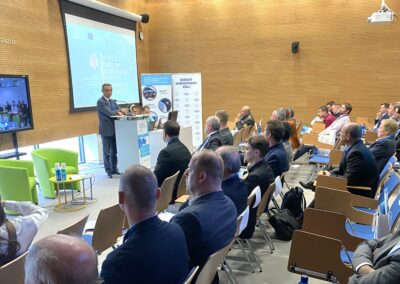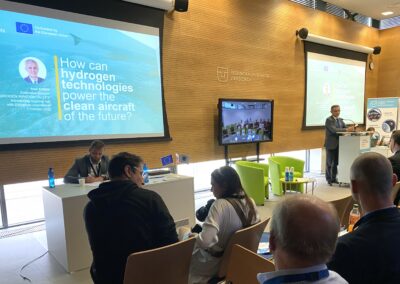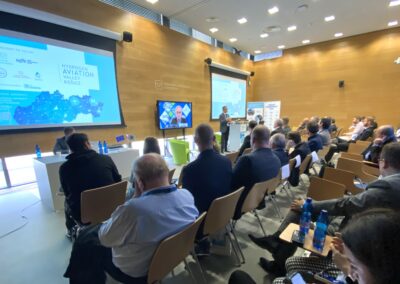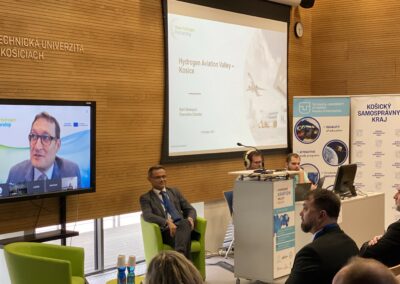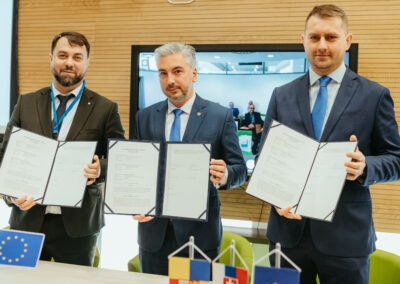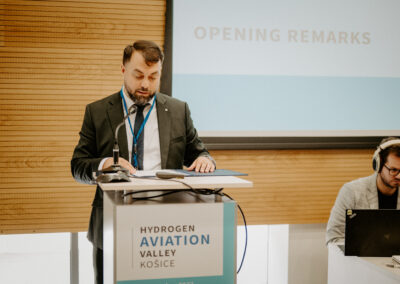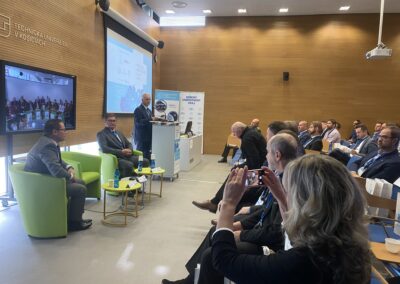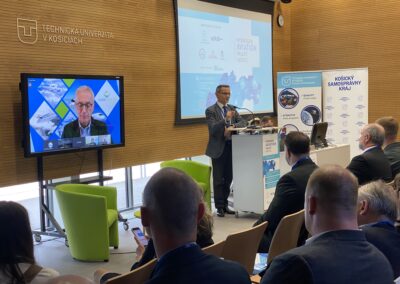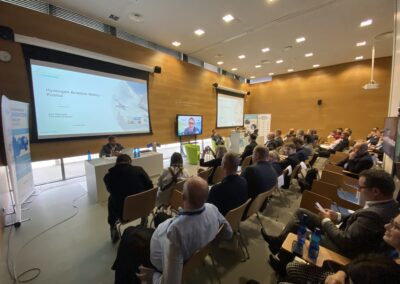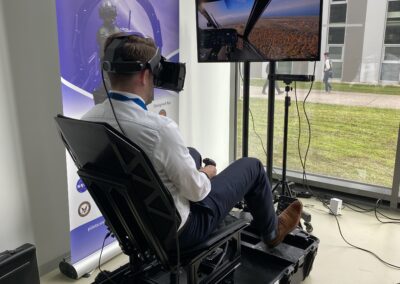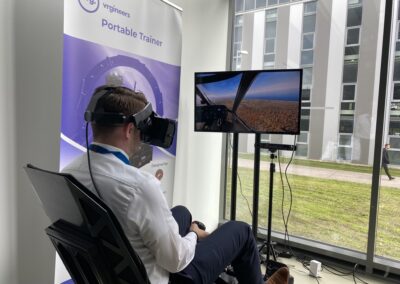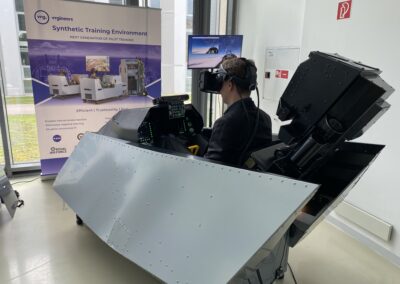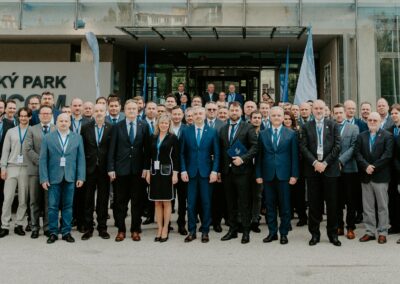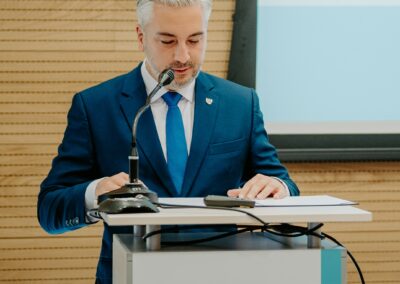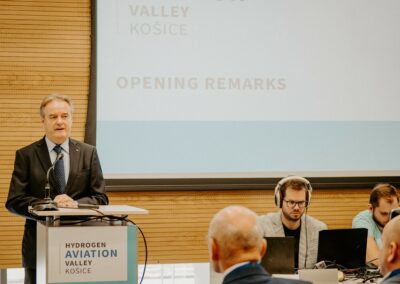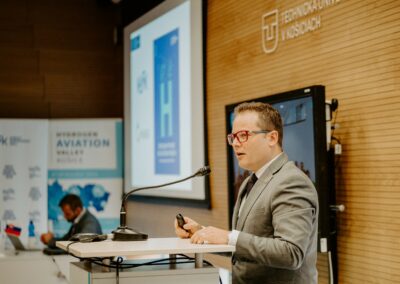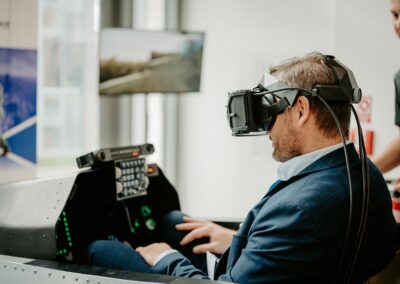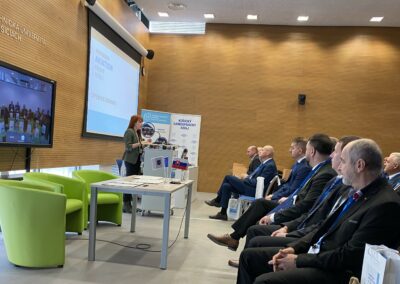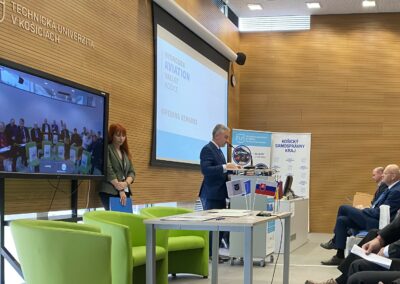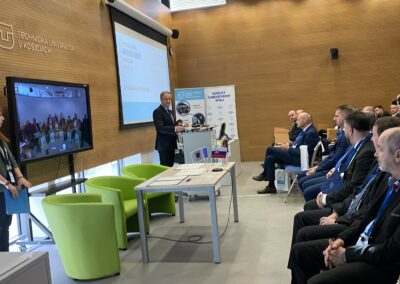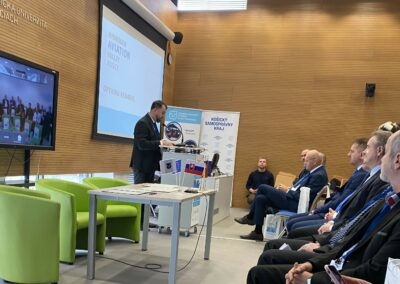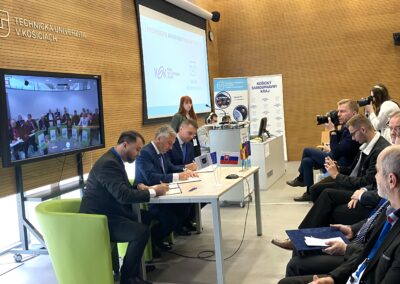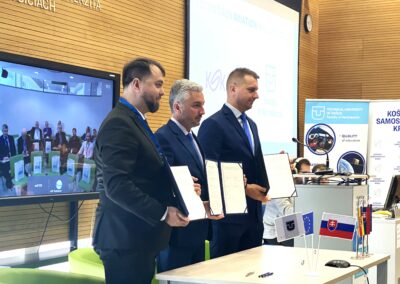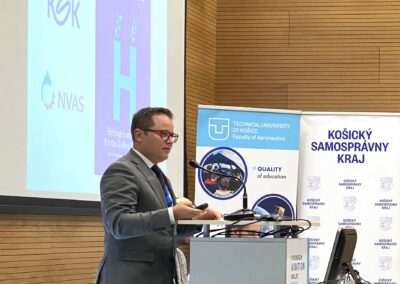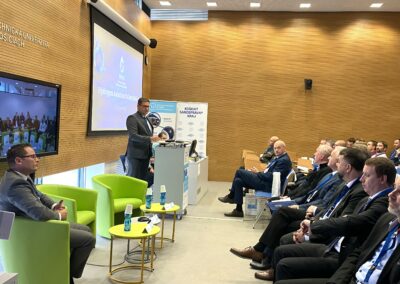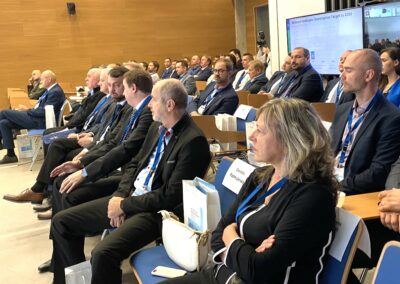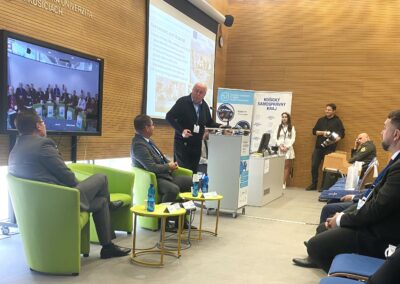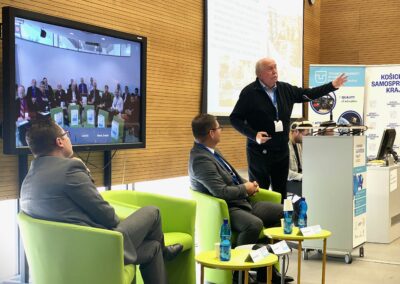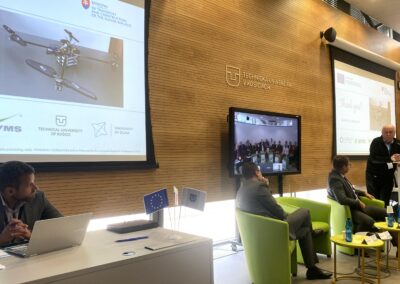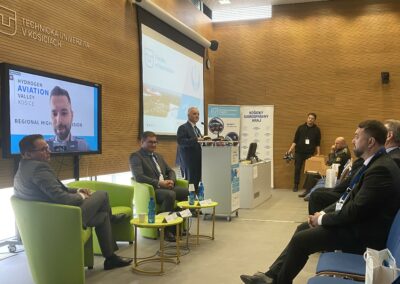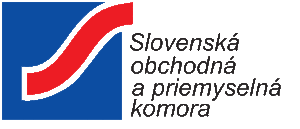KOSICE, SLOVAKIA – OCTOBER 05, 2022: During the European hydrogen week, the Technical University in Kosice welcomed an initial working meeting aimed at presenting the vision of a regional hub of European importance Hydrogen Aviation Valley Kosice.
The organizers of the event and the main partners of the initiative led by the Faculty of Aeronautics of the Technical University in Kosice and the Kosice self-governing region welcomed representatives of the scientific and research community, industry and regional government from more than six European countries to the University Science Park TECHNICOM. The main section was the presentation of the directors of Clean Aviation and Clean Hydrogen joint undertakings, who, in addition to describing the mission of the joint ventures, contributed recommendations for cooperation at the EU and regional level.
Hydrogen Aviation Valley Kosice began its journey with a Memorandum of Cooperation, which was signed by the president of the Kosice self-governing region, Rastislav Trnka, and the dean of the Faculty of Aeronautics of the Technical University in Kosice. Among the common areas of further cooperation beyond research and implementation of emission-free technologies in air transportation, there was an agreement to support and seek ways to develop urban air mobility, integration of unmanned aerial systems and virtual reality in transport. In the words of President Trnka: “The climate crisis is raising alarm bells around the world. Here in the Kosice region, up to one-third of the total amount of CO2 in Slovakia is produced. We are aware of this, which is why we were the first region in Slovakia to develop our own hydrogen strategy. We are working on launching of the operation of suburban buses that run on hydrogen within four years. We have also been supporting the development of the Kosice Airport for a long time, as it is in the interests of the inhabitants of eastern Slovakia and beyond. Therefore, reducing the aviation industry’s carbon footprint is not a local problem but a global one. That is why we are embarking on inter-regional and international cooperation.” Together with an important partner at the regional self-government level, it is necessary to connect with professional capacities. “The Faculty of Aviation builds on a more than 60-year tradition of education and science in the field of aviation and space technology. Our goal is to participate in the European vision of Clean Aviation and offer expertise in, for example, the development of hybrid propulsion systems and control algorithms for turbine engines. At the same time, we want to continue in the field of digitization based on the research center of Air Traffic Management systems to expand research in the field of Unmanned Traffic Management and their mutual integration,” said the dean of the Faculty of Aeronautics.
Furthermore, the conference has been supported by the Slovak Centre of Scientific and Technical Information (Centrum vedecko-technickych informacii SR, CVTI). “The Aviation Hydrogen Valley is a successful example of popularization of world class science and technology in Central Europe. Many of the scientific and technological contributions presented here have been invented and developed in Slovakia.” Said Daniela Stiel Podmajerska, Director of the Economics and Operations at Slovak Centre of Scientific and Technical Information (SCSTI).
After the successful launch in Kosice, the partners of the initiative will focus on creating a professional working group and inviting other partners from the scientific and research as well as industrial sectors, the aim of which will be the preparation of a strategy leading to the creation of a unique regional hub.
About Faculty of Aeronautics of the Technical University of Kosice (LF TUKE)
The Faculty of Aeronautics of the Technical University of Kosice (LF TUKE) was established on 1 February 2005 as the ninth faculty of the Technical University of Kosice. Its establishment ensured the continuation of the world-famous tradition of aviation education in Kosice. Since 2016, in addition to the preparation of aviation specialists for civil aviation, it also provides university education for the needs of the Air Force of the Armed Forces of the Slovak Republic. The faculty has been providing practical training of professional pilots and flight technicians in cooperation with the Slovak Training Academy at the Kosice Airport since 2017. Apart from the field of aeronautics, Faculty has strong field in cubesat development area as project leader of GRBAlpha cubesat testbed.
About Kosice Self-governing Region
The Kosice Self-governing Region (Slovak: Kosicky samospravny kraj, KSK) or the Kosice Higher Territorial Unit (Slovak: Kosicky vyssi uzemny celok, KVUC) is one of Slovakia’s eight “self-governing regions” whose territory is identical with that of the administrative Kosice Region. The Kosice Region has great potential for development of various industries. It offers opportunities to invest into traditional industry sectors such as metallurgy, machine and electric engineering alongside fast developing and dynamic ICT sector, creative industry, and biomedicine. There are high quality universities, secondary and vocational schools and professional training centres that offer educational programs tailored to suit the needs of investors.
About Slovak Centre of Scientific and Technical Information (SCSTI, CVTI)
The SCSTI is the national information centre for science, technology, innovation and education and specialized scientific library of the Slovak Republic. It coordinates activities and ensures the operation of interdisciplinary R&D centers and national infrastructures for research, development, innovation and education. Is the host institution of the National Contact Points for HORIZON 2020 and ensures operation of the Slovak Liaison Office for R&D in Brussels.
Media Contact
M.Eng. Ing. Marek Kosuda, PhD
Vice-dean for development, National U-space implementation working group member
SRG Clean Aviation JU member, marek.kosuda@tuke.sk, SOURCE: LF TUKE


